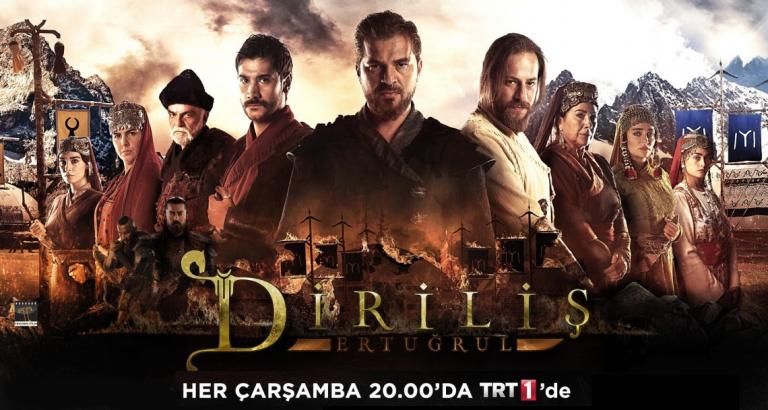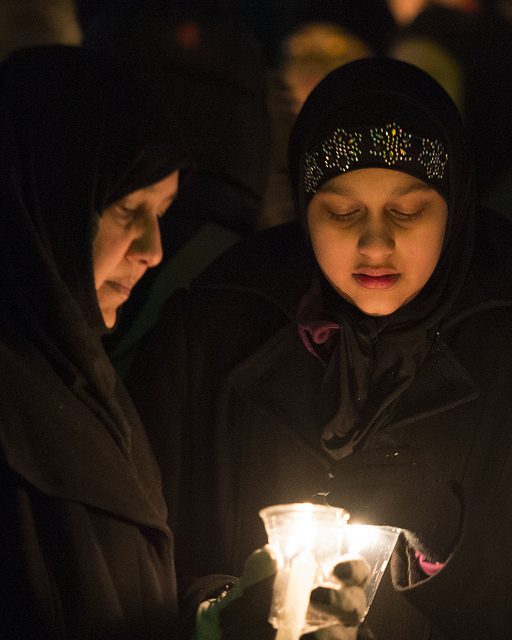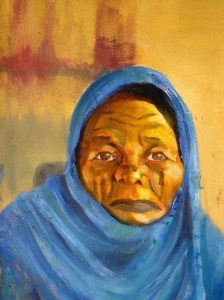Even if you’re not watching them, it seems that certain shows still creep onto your consciousness these days, thanks to your friends on social media feeds who won’t stop talking about them (This Is Us fans, I’m looking at you). Some of the most popular shows reflect modern anxieties and elucidate a fear of an oppressive future if we aren’t more careful about who we elect into political office and how we use our technology.
Shows like Black Mirror and The Handmaid’s Tale portray a modern, dystopic, near-future where citizens have lost rights that inhabitants of today’s democracies take for granted. It’s not all doom and gloom, though. The latest season of Game of Thrones ended with our heroes finally joining forces to battle the the White Walkers (oops, spoiler), the show’s ultimate villains and obvious metaphors for fascism. Even if you don’t watch these shows, their characters and the stories they tell have made it to the zeitgeist and are part of our culture today.
Then there’s the Turkish historical drama, Ertugrul: The Resurrection, one of the most zeitgeisty show that is currently being binge-watched by more than half of my Muslim Facebook feed.
Ever since it was included in the Netflix roster, it seems that everyone’s watching the sweeping drama based on the life of the 13th century Oghuz warrior Ertugrul (pronounced “air-TU-rule”). Ertugrul was the father of Osman Ghazi I, the founder of the Ottoman Empire, whose rule in the Middle East, southeastern Europe, parts of Asia and Africa spanned 600 years. Ertugrul: The Resurrection has captured the imagination of so many Western Muslims I know – families, religious scholars, lay people, men & women, retired Baby Boomers, Millennials.
This list by Lamya Hanchaoui, retweeted by American Imam Suhaib Webb on the 23 Signs You Are Officially Obsessed With Ertugrul: The Resurrection, is a good example of what I mean.
For Western Muslims there is a catharsis in finally seeing a well-crafted, beautifully scored, aesthetically pleasing drama that centers observant Muslims as agents of our own history. Muslims are shown as wealthy, powerful — even if not always benevolent — rulers. And the 13th century Turkic Oghuz characters who seem so familiar – they are shown observing rituals of our shared faith; washing and offering daily, Friday, and funereal prayers, reciting Quran, praising God and the Prophet Muhammad PBUH as a regular and natural part of their lived experience – are the heroes of a Crusader drama, flipping the usual script.
Identity, Storytelling, & History
In addition to seeing characters observe Islam in a way that is familiar to many of us, the show also has it’s Muslim characters grapple with still-relevant themes, such as the unity of the ummah (global Muslim community), treating friend and foe with honor and chivalry, having pure intentions, keeping promises, humility and modesty in the face of glittering wealth and power, respect for family, working for justice while having tawakkul (trust) in God’s ultimate plan. In fact, while the show is set in the 13th century, the lessons it’s characters learn are obviously meant to educate, excite, encourage and empower a modern Muslim audience, especially the domestic, post-secular Turkish one, as academic Dr. Nagihan Haliloglu writes.
In one of the early episodes of the first season, the great Sufi mystic Ibn al-Arabi* gives advice to a downtrodden Ertugrul:
“Life is a school; each one of us is a student and the only teacher we have is God. Manifesting His attributes, He tests us. However, distress and relief, favors and trials all come from Him. Everyone needs to take their own test. You need to be someone who passes the test and knocks down your ego, son. Once this happens, you will be the best fighter and hero.”
These themes have not gone unnoticed by non-Turkish Muslim viewers. Atlanta’s Imam Nadim Suleiman Ali, who was introded to the show by his non-Muslim brother-in-law writes, “I like the show because it epitomizes the values that we are supposed to have as Muslims: The commitment to family, the importance of respecting leadership, the struggles that previous generations went through to preserve Islam. As a student of the martial arts the swordsmanship is da bomb!”
The Mad Mamluks podcast recently hosted a roundtable with Dr. Mohammad Ghilan on the show. One of the panelists described Ertugrul: The Resurrection as “a great reminder of why the Muslims became great. The characteristics the [characters] possessed, the relationship they had to religion. You can feel proud of being Muslim — it’s a morale-booster.” The roundtable features an informative conversation on the history of pre-Ottoman Turkey and a robust discourse on the moral lessons a Muslim viewer will glean while being simultaneously entertained by the show.
Unfortunately, there is scant discussion of Ertugrul’s powerful and nuanced female characters by the all-male panelists. (Shameless hint: This can easily be remedied by holding another roundtable).
But not everyone is thumping their chest and incorporating #EyValla in their daily vocabulary. There are those who say that the Erdogan-approved Ertugrul is pure propaganda designed to cultivate in Turkish citizens an unhealthy obsequience for top-down leadership. That the idealization of respecting a leader’s orders, even if it causes personal heartache, is a dangerous lesson to teach in a modern Turkey with shaky democratic institutions.
An Arab-American cultural curator dislikes the show for, among other reasons, glossing over real harms done to the communities that became subsumed into the Ottoman Empire. She tells me, “They are like ‘oh we are the great revivers – we fought the Mongols & crusaders.’ True, but let’s not for get that the Ottoman Empire did not in any means raise the status of women or empower them. You’re telling me the tribe women played a huge role, but then what? Nothing; women were reduced to Hareem/sex slaves. Trickled down to that they didn’t read or write and remained ignorant for decades. While the women before the Ottoman Empire were the patrons of arts & science.”
It seemed that everyone had an opinion. Ertugrul became so ubiquitous that I just couldn’t ignore it anymore. Even people who are not Muslim were loving it. I needed to learn why on earth is this story about a 13th century Oghuz warrior so popular (there are even websites** that sell the jewelry and costumes shown on the show), so I decided to commit the time and start watching.
From the very first episode, I understood why.
Getting Hooked
Having already binge-watched 45 episodes in a week (this may be the most outlandish thing I’ve ever written), I am hooked. I find Ertugrul: The Resurrection genuinely entertaining, though perhaps not in ways the showrunners intended. I have a halal drinking game (ginger ale and cranberry juice) every time a character essentially time travels from the steppes to Aleppo to the hidden Crusader castle in the blink of an eye. Horses are fast, but it’s not like they’re riding Buraq here! And, there’s the time when Crusaders torture a captured Muslim by strapping him to a wheel, turning him upside down and forcing him to drink an electric blue potion that gives him hallucinations.
Like, that’s not how medieval Europeans used the wheel to torture, folks.
I do enjoy the show, but I definitely watch with eyes wide open. I love the beautifully rendered prayer and dhikr scenes, and I am not above taking notes when Ibn al-Arabi or Ertugrul’s mother, Hayme, is in a scene. Most of all, though, I share in the catharsis of watching a drama where people who pray like me are centered.
But, the show isn’t perfect.
Most of the villains are cartoonish. Treacherous conspirators literally cackle with glee and clink ill-gotten gold while openly discussing their plans. Aside from two righteous Christian sisters, religious minorities are negatively portrayed. The evil, scenery-chewing Cardinal Thomas and the Knight Templar Petrucchio glower through every scene they are in and are the opposite of subtle. Christians cynically infiltrate palaces and tribes in an effort to ignite another Crusade and wrench Jerusalem from Muslim rule. And in general, there is little character growth, though I’m still holding out hope for the rehabilitation of one of Season 1’s most hated villains, Ertugrul’s ambitious sister-in-law, the “serpent-eyed” Selcan Hatun.
Dynamic Damsels Not In Distress
Speaking of Selcan, it is refreshing to watch a drama with many different types of Muslim female characters, even though they are still limited within the patriarchial framing of the show. Mother Hayme is the most powerful woman in the show; her husband, the Kayi clan’s leader Suleyman Shah, regularly consults, consoles and is consoled by her. Her son Ertugrul constantly prays that God will keep her health so that she may continue to lead the tribe for years to come. She’s respected by everyone in the tribe, but only because of who her husband and sons are.
While Suleyman Shah does often ask for her opinions, Hayme never gives him advice in public. Her influence is limited to the the women of the tribe and is otherwise wielded in the privacy of her family tent. She has no natural daughters, yet is the spiritual mother figure of all the women in the tribe, including the economically critical carpet-weavers. Most notably, Hayme is the spiritual mother to her daughter-in-law Selcan and Selcan’s younger sister Gokce, and Aykiz, the fiancee of one of Ertugrul’s warrior-bros.
Why are there so many motherless daughters in the world of Ertugrul: The Resurrection? Almost every major female character is an orphan: Selcan (who struggles with infertility for years) and Gokce’s mother died in childbirth. The tempestuous Aykiz was raised by her widower father, Wild Demir. The mothers of the Seljuk and Ayyubid princesses Halime Sultan and Leyla Sultan are long dead.
Even the Christian sisters, Eleanora and Isadora, are motherless and live at their uncle Petruccio’s mercy. It seems the message the show is highlighting here is that the nation is the mother, and Ertugrul, his warrior-bros, the sincere men of faith, the rightly-guided male leaders are her husbands, fathers, and sons. The female characters exist to underscore the precious nature of the nation, but they are allowed a measure of agency.
The women in this show are not your typical damsels in distress: In addition to Mother Hayme, Halime Sultan, Aykiz, Leyla Sultan, and Isadora are consistently portrayed as brave, astute, nuanced and strong. Sweet Gokce and Eleanora are shown to be kind and steadfast. The love-to-hate-her villain, Selcan Hatun, is shown to have complex motivations for her actions and the two-faced Crusader infiltrator Eftalia is intelligent and witty. All these women are shown as capable warriors fighting for their truths, even within the limitations of the patriarchy.
There are pointed references to the Kayi tribeswomen as fierce fighters and several scenes depicting them, including the fearless Aykiz, shooting bows and arrows in preparation for war. The Seljuk princess, Halime Sultan, even wields a weapon in self-defense in the very first episode. Still, these female characters are all circumscribed by the men in their lives, which may be related to why there are so few mothers in this world.
Perhaps there aren’t many mothers because Ertugrul: The Resurrection is ultimately a show about men, power, and masculinities.
“Let The Men Be Men”
This show valorizes a certain kind of ruler, such as Suleyman Shah, Ertugrul’s father. He’s revered as the principled, benevolent, judicious, semi-democratically elected leader of the Kayi clan. He’s still a formidable fighter in his old age. Disobeying a legitimate leader will lead to the rupture of the clan, the country, the ummah, we are told time and again. This trope holds true also for the Christian villains who are willing to contravene their own values in order to achieve their goal of inciting a new Crusade. Although some of his rulings are emotionally and physically hurtful to people who love him, his word once given is a decree, and none who follows Suleyman Shah is willing to defy him.
There are clear gender roles for men and women, and if either transgresses, order will break down. Ertugrul consistently upholds these roles in an effort to maintain equilibrium. He admonishes the effete and decadent Ameer of Aleppo to let competant men take on the affairs of the state. And he berates Selcan for meddling in clan politics, interfering with the affairs of men.
The traitors in the Kayi tribe and in the Aleppo palace, who collaborate with the Crusaders for the downfall of Jerusalem in exchange for gold and limited political power are contrasted with Suleyman Shah, who reminds Ertugrul that though he’s the leader of the clan, he owns nothing in this earthly life, save a handful of sheep. Both his father and Ibn al-Arabi repeatedly tell Ertugrul that a leader is the servant of his people; as soon as a man is swayed by greed or lust, God will not smile on his endeavor. In fact, the men who ultimately fail attaining power are often shown surveying captured women in a harem or counting their ill-gotten gold.
The Muslim villains who have allied with the enemy will never achieve ultimate power in the show. Their masculinity is the inverse of that which is represented by Ertugrul, his warrior-bros the Alps, Suleyman Shah and Ibn al-Arabi. These villains are portrayed as two-faced hypocrites who are easily swayed into selling out their faith by their greed for earthly wealth. They are more concerned with enjoying rich foods, women, and gold than they are with the fate of Jerusalem, or the danger of the invading Mongols in the east. They are also cruel and physically abusive to those under their care, especially women.
In Ertugrul: A Resurrection, a man becomes a leader by virtue of his own sincerity, just actions, and by the consensus of others in his orbit. He is a servant-leader and warrior-servant. He’s decisive and driven by a sense of justice, not self-aggrandizement. He’s no anti-hero; if he has moral flaws, he works and prays to mitigate them. And once a man becomes a leader, he shoulders the responsibility of not only his own clan, but also a metaphsiscal responsibility of the entire Muslim ummah. Throughout the series, our protagonist Ertugrul responds with astaghfirullah (seeking God’s forgiveness) in response to compliments. Becausue he understands that he’s only responsible for his actions; if there’s a good outcome, that comes from God.
A Hero For Our Time
For Muslims still reeling from the emasculizing aftermath of colonization, the self-reliant, Muslim male leader trope idealized in Ertugrul is seductive. He is the Bey (or “bae”) Muslim men aspire to be and Muslim women aspire to marry. While writing this piece, I asked my people to share why they watch the show. Across the board, there is an overt admiration of Ertugul as an ideal, noble Muslim man. One of my friends, a Millennial American Muslim man aptly summarizes why Ertugrul: The Resurrection has captivated so many viewers:
“Ertugurul is a historical figure portrayed in the show as one man adhering to his Islamic principles and beliefs in a world that largely is losing its universal morals and ethics—in both his own community (his tribe) and in other religious and ethnic communities he interacts with. His sole goal is to establish peace and justice. He lives and breathes this principle. Seeing him live his faith and try his best to live Islam in a world that often misunderstands and repels him often leaves him feeling and literally alone—something we can all empathize with as Muslims living in the West.
In a time where the Muslim world is going through so much turmoil it’s refreshing to watch this TV series and derive so many lessons (especially from Ibn Arabi and Hayme Sultan). I think the reminders through the themes in the TV show are a powerful reminder to the Muslim community to look within and start living Islam. This is precisely what the show is relating through every episode: to adhere to Islamic principles, values, beliefs and ethics even if the entire world is against you—including your community and family.”
*The historical figures of Ibn al-Arabi and Ertugrul likely never met in person
**I don’t endorse this, or any, website selling Ertugrul souvenirs













